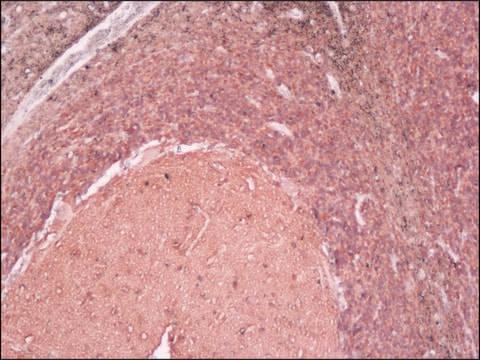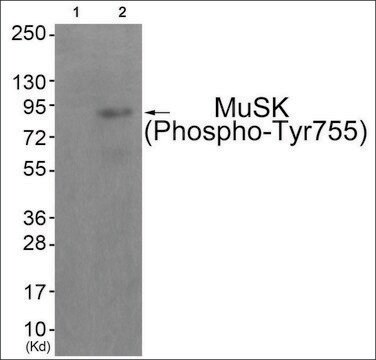ABS549
Anti-MuSK Antibody
serum, from rabbit
Sinónimos:
Muscle, skeletal receptor tyrosine-protein kinase, Muscle-specific tyrosine-protein kinase receptor, MuSK, Muscle-specific kinase receptor
About This Item
Productos recomendados
origen biológico
rabbit
Nivel de calidad
forma del anticuerpo
serum
tipo de anticuerpo
primary antibodies
clon
polyclonal
reactividad de especies
mouse, human
técnicas
immunohistochemistry: suitable
immunoprecipitation (IP): suitable
western blot: suitable
Nº de acceso NCBI
Nº de acceso UniProt
Condiciones de envío
wet ice
modificación del objetivo postraduccional
unmodified
Información sobre el gen
human ... MUSK(4593)
Descripción general
Inmunógeno
Aplicación
Signaling
Signaling Neuroscience
Immunohistochemistry Analysis: A representative lot detected MuSK in mouse soleus muscle tissue (Simeone, L., et al. (2010). The Journal of Neuro. 30(19):6620-6634).
Immunoprecipitation Analysis: A representative lot immunoprecipitated MuSK in C2C12 cell lysate (Simeone, L., et al. (2010). The Journal of Neuro. 30(19):6620-6634).
Calidad
Western Blotting Analysis: A 1:1,000 dilution of this antibody detected MuSK in 10 µg of HEK293 cell lysate.
Descripción de destino
Forma física
Almacenamiento y estabilidad
Handling Recommendations: Upon receipt and prior to removing the cap, centrifuge the vial and gently mix the solution. Aliquot into microcentrifuge tubes and store at -20°C. Avoid repeated freeze/thaw cycles, which may damage IgG and affect product performance.
Cláusula de descargo de responsabilidad
Not finding the right product?
Try our Herramienta de selección de productos.
Código de clase de almacenamiento
12 - Non Combustible Liquids
Clase de riesgo para el agua (WGK)
WGK 1
Punto de inflamabilidad (°F)
Not applicable
Punto de inflamabilidad (°C)
Not applicable
Certificados de análisis (COA)
Busque Certificados de análisis (COA) introduciendo el número de lote del producto. Los números de lote se encuentran en la etiqueta del producto después de las palabras «Lot» o «Batch»
¿Ya tiene este producto?
Encuentre la documentación para los productos que ha comprado recientemente en la Biblioteca de documentos.
Nuestro equipo de científicos tiene experiencia en todas las áreas de investigación: Ciencias de la vida, Ciencia de los materiales, Síntesis química, Cromatografía, Analítica y muchas otras.
Póngase en contacto con el Servicio técnico






